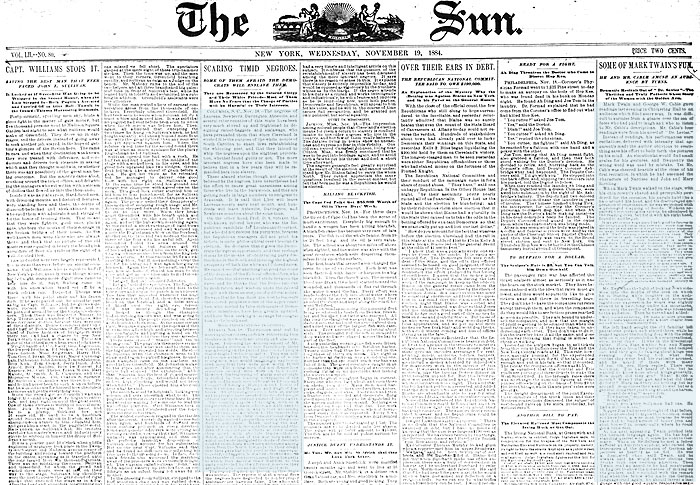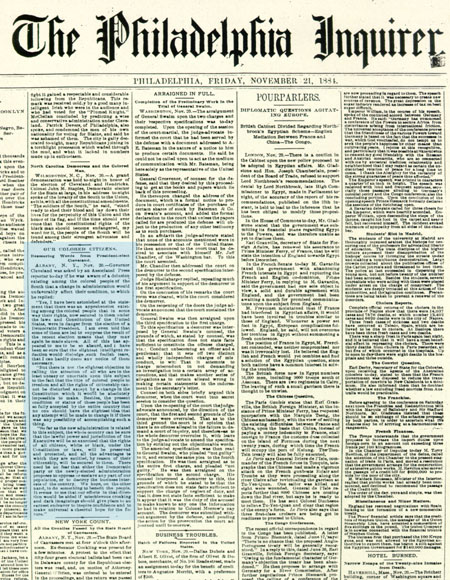The day after Philadelphia MT and Cable entertained an audience in Brooklyn. Pond's advertisement for their talk in the 21 November Brooklyn Daily Eagle ran right next to this editorial taking Blaine to task for trying to use their fears to arouse southern blacks to vote against Cleveland. The Eagle was also a staunchly Democratic paper, but its smug claims that southern blacks had nothing to worry about and blindness to any of the concerns about racial discrimination and injustice that Cable would express in his forthcoming essay is typical of most papers in the north:
Calming the Fears of Mr. Blaine's Colored Victims
Deeper with every day grows the satisfaction of the American people with the issue of the recent contest, for those who declined to put away their idol in the heat of the campaign are beginning to realize the influences that they were strengthening in their support of Mr. Blaine and the venomous character of the candidate whom for the third time they refused to make President. As the animosities subside and cool reason takes the place of overheated party loyalty our friends who were lately the enemy will more and more cheerfully acquiesce in the popular verdict, and gratified with the gallant fight they made for an unworthy leader, confess what is true, that their own chivalry idealized an impostor and endowed him with qualities that existed in them, not in him. In was in such a spirit of devotion that the adherents of the Stuarts held firmly by a cause that was noble in its friends but utterly detestable in the house that represented it. To the exposure of his own abominable character Mr. Blaine is recklessly contributing whenever opportunity offers, and is doing more to reconcile the men of the Republican party who supported him with the Independents who saw through him and rejected him than the most cordial overtures could accomplish. In nothing has he exposed his recklessness and hopeless lack of principle more foolishly than in his attempt to inflame the colored people of the Southern States against their white fellow citizens. To his agents during the campaign, to his own poisoned tongue since his defeat the unthinking colored people owe the anxiety and apprehension they have felt since the restoration of the Democracy to power. The assurance that Governor Cleveland's election meant the re-establishment of slavery was a poor campaign lie circulated by venal politicians without success so far as the object of provoking riots was concerned. Even the negroes treated this effort with contempt. But since the rattlesnake politician of Maine turned on them to infect them to madness with his own venom, it seems, the fear has taken hold of not a few of them. What the poor creatures need in this cruel plight is a soothing assurance from Democratic authority, and to this end the calm statement of the President elect is wisely brought to their attention. Of course no reasonable man among them has given way to any fear at all; on the contrary the more enlightened colored people have already discovered that the restoration of prosperity to the South includes themselves, and that they as citizens will have their full share in the general improvement of business. Had they understood at the outset the utter inability of this human crotalus to speak the truth they would not have been so alarmed at a danger that existed only in his false utterances.
Traveling through these cities, looking for the notices and reviews of his nightly readings in the local papers, MT must have seen these and other stories and comments about what might happen to the "freedmen." In this context, his decision over the reading tour's Christmas break to add the "Evasion" chapters of Huck Finn to his part of the Twins' programme seems a calculated effort to exploit the white public's thoughts and feelings about the issue of how blacks should or would be treated, though what that episode from the novel is saying about that issue remains a contested interpretive point.
|



